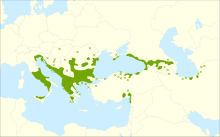Carpinus orientalis
| Carpinus orientalis | |
|---|---|
| | |
| Scientific classification | |
| Kingdom: | Plantae |
| (unranked): | Angiosperms |
| (unranked): | Eudicots |
| (unranked): | Rosids |
| Order: | Fagales |
| Family: | Betulaceae |
| Genus: | Carpinus |
| Species: | C. orientalis |
| Binomial name | |
| Carpinus orientalis Mill. | |
 | |
| Distribution map | |
Carpinus orientalis, known as the Oriental Hornbeam, is a hornbeam native to Hungary, the Balkans, Italy, Crimea, Turkey, Iran, and the Caucasus.[1][2] and occurs usually on hot dry sites at lower altitudes in comparison to the Carpinus betulus (European Hornbeam).
Description
The Carpinus orientalis is a small tree, rarely over 10 m tall and often shrubby. It has minute, with small leaves, 3–5 cm long.
The seeds have a simple bract, not trilobed like Carpinus betulus, that is about 2 cm long.[3][4]
- Cultivation
In recent years, this species has been extensively used as an ornamental tree for Bonsai.
References
- ↑ http://apps.kew.org/wcsp/namedetail.do?name_id=34405
- ↑ "Carpinus orientalis at the NPGS/GRIN database". USDA. Retrieved 2008-10-24.
- ↑ Czerepanov, S. K. 1981. Sosudistye Rasteniia SSSR. 509 pages. Nauka, Leningradskoe Otd-nie, Leningrad
- ↑ Browicz, Kasimierz. Flora Iranica : Flora des Iranischen Hochlandes und der Umrahmenden Gebirge : Persien, Afghanistan, Teile von West-Pakistan, Nord-Iraq, (cont) 97: 2. 1972.
| Wikimedia Commons has media related to Carpinus orientalis. |
This article is issued from Wikipedia - version of the 7/25/2016. The text is available under the Creative Commons Attribution/Share Alike but additional terms may apply for the media files.